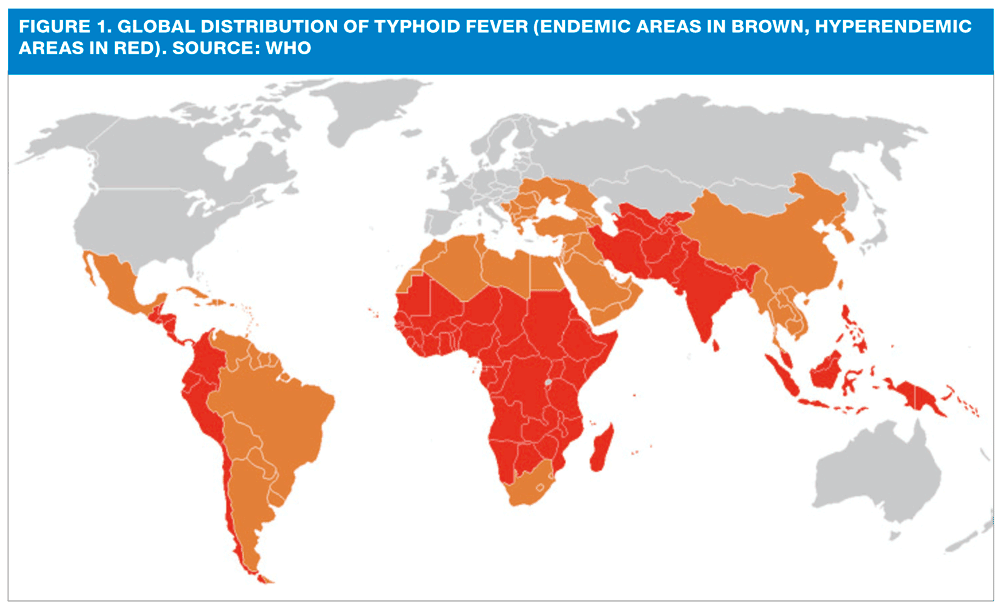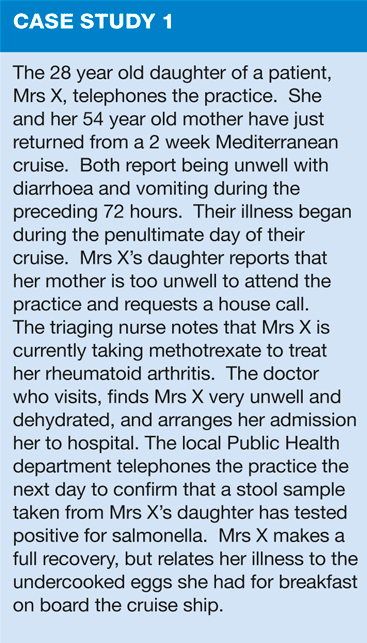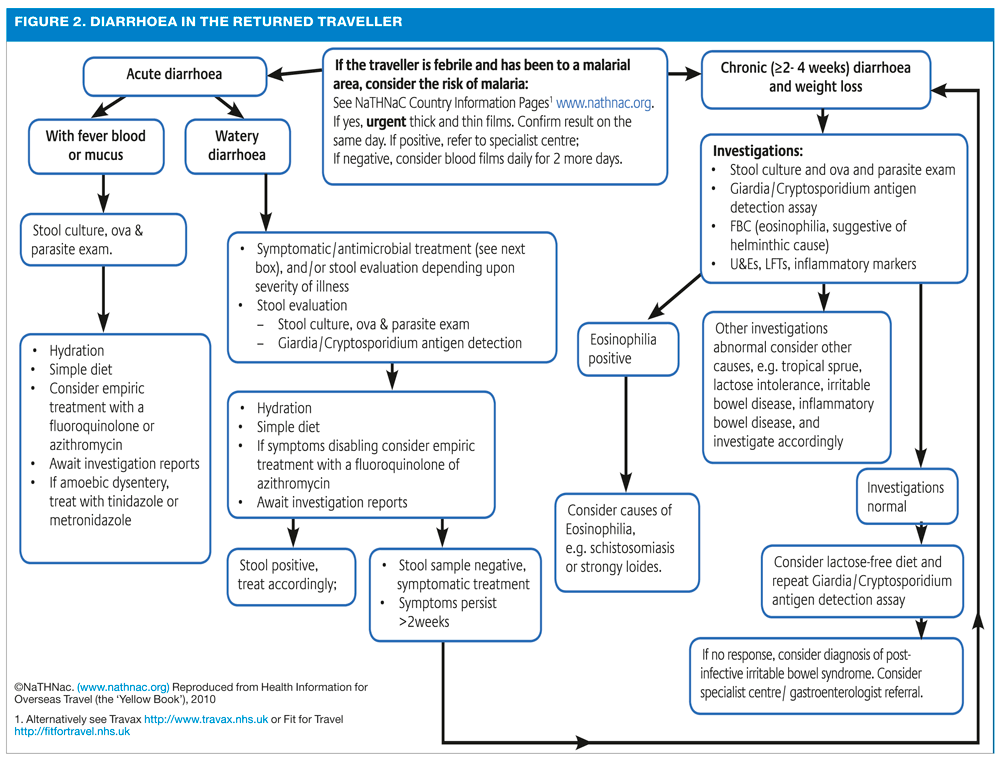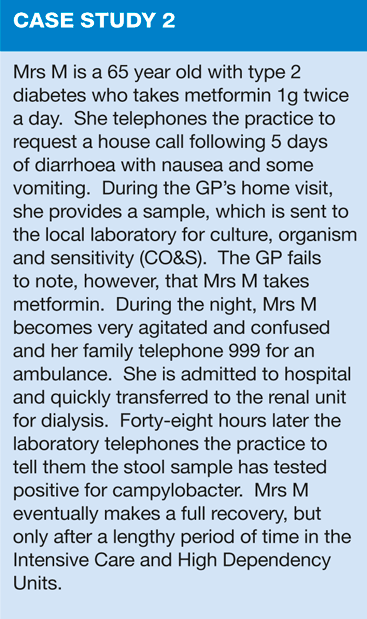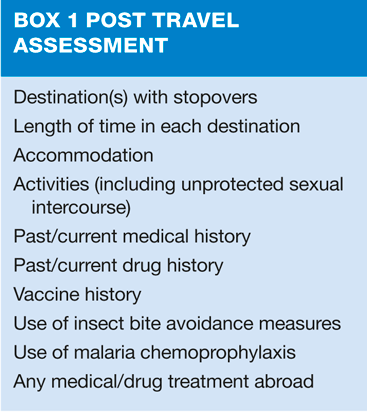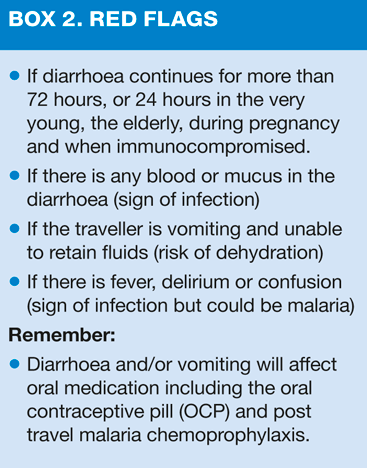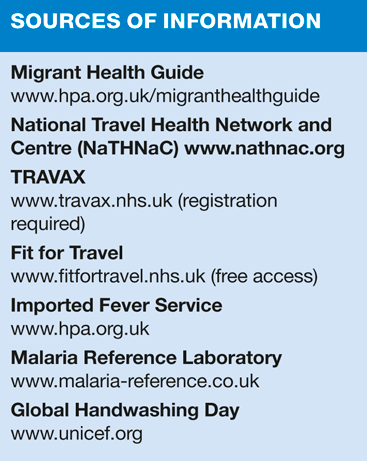Travellers' diarrhoea part 2 The returning traveller
Margaret Umeed
Margaret Umeed
RGN MSc. MFTM (RCPSG) FQNIS
Specialist Nurse Practitioner, (General Practice) Glasgow
Most people who succumb to travellers' diarrhoea will do so while they are away - but for some, symptoms will persist after their return. What should the practice nurse advise these patients?
Travellers' Diarrhoea (TD) is estimated to affect between 20-60% of those travelling to low income / high risk areas, in Asia, the Middle East, Latin America and Africa.1 It is the most common illness seen in travellers and is caused by a variety of organisms such as E. Coli, Salmonella, Shigella, Campylobacter, Enteric viruses, Norovirus and Rotavirus, Giardia and Cryptosporidium. Incubation periods range from a few hours to a few days. TD is defined as 'the passage of at least three loose to watery stools in a 24 hour period, with or without other symptoms such as abdominal cramps, nausea and low grade fever'. TD typically occurs during the first week of travel and is usually self limiting, lasting 3-4 days, however symptoms can occasionally last longer than one month and can lead to irritable bowel syndrome (IBS).1 With the World Health Organization (WHO) estimating that more than 900 million trips are taken each year,2 and estimates of TD in the region of 50%, it does not take much to work out that TD affects huge numbers of travellers. A study of some 784 travellers from the United States, identified that 26% of travellers returned home unwell: 56% of whom became unwell after their return with diarrhoea, respiratory illness, skin disorders and fever being the most commonly reported conditions.3 Forty-six per cent of those who returned ill sought medical care, so this is a group of patients that the practice nurse may well be required to triage.
POST TRAVEL RISK ASESSMENT
All callers to a triage system, in whom a history of diarrhoea is ascertained, should be questioned about their recent travel history. Although travel to a high-risk (usually low income) area increases the risk of TD, travellers to all areas can be at risk of infection, as illustrated in Case Study1. For those who have travelled, a detailed post travel history should be taken (see Box 1). Travel advisors should be aware that routine medications taken for chronic conditions can cause problems in those presenting with diarrhoea. For example, Disease Modifying Drugs (DMARDs) such as methotrexate, which can potentially cause immunosuppression, may result in a more severe illness; and oral hypoglycaemics such as metformin can cause renal failure in anyone presenting with diarrhoea (see Case Study 2). Any traveller presenting with red flags post travel (see Box 2) should be advised to attend for medical advice and further examination.
Although a vaccine history is important, the travel health advisor must remember that vaccines are not 100% effective. In addition, many last minute travellers may have been unable to access an appointment for travel health advice or vaccination and may have travelled without such protection, or, as in the current situation relating to typhoid vaccine, may not have been able to access the vaccine due to supply issues.4 Even in those who have been able to access advice and vaccination, the possibility of a vaccine related disease such as typhoid must be considered if the traveller has been in a high risk area (see map) or participating in a high risk activity such as extended low budget travel. The efficacy of the injectable typhoid vaccine ranges from approximately 60-80%, so the voluntary recall of the typhoid vaccine Typhim Vi by Sanofi Pasteur MSD recently, due to a potentially low antigen content, has caused widespread concern that travellers may be at increased risk of infection.5
NaTHNaC ALGORITHM
NaTHNaC has a very useful algorithm, Diarrhoea in the returned traveller, in the Health Information for Overseas Travel 'Yellow Book' (Figure 2). The initial key point is for health care providers to ascertain whether or not the traveller is febrile, and has been to a malarial area. Diarrhoea, nausea and vomiting can all be presenting signs of falciparum malaria. If a traveller presents with fever, and has travelled to an area with a risk of falciparum malaria during the preceding 3 months, they should ideally be referred to the local infectious disease (ID) unit following discussion with the ID consultant on call. Any traveller presenting with fever and a history of travel to a region with falciparum malaria, even if they have been fully compliant with insect bite avoidance measures and malaria chemoprophylaxis, has malaria until proven otherwise.
If there is no risk of malaria, then the algorithm divides into 'acute' and 'chronic' presentations, with chronic defined as >2-4 weeks diarrhoea and weight loss. Investigations under the 'acute' arm include stool sample for culture, ova and parasites, and giardia and cryptosporidium antigen detection; management includes hydration if required, and emipiric treatment with a fluroquinolone or azithromycin. Additional tests suggested under the 'chronic' arm include full blood count (eosinophilia would suggest helminthic infection) and routine biochemistry (U&Es/LFTs and inflammatory markers).6 A similar algorithm for migrant patients with diarrhoea is available on the Migrant Health Guide (see sources of information).
THE IMPORTED FEVER SERVICE
As travel health advisors in the UK, we tend to think of travel related infection as being our UK travellers returning with infections acquired during their travels, however increasingly in the UK we see travellers from abroad arriving in the UK either as visitors, students or migrants, who bring infection with them from their home countries. Partly in response to this increase in global travel, and partly in response to the threat of infection during the Olympic Games this summer, the Imported Fever Service was established under the auspices of the Health Protection Agency. The service is available to healthcare professionals after they have discussed the case with their local consultant in infectious diseases, microbiology or virology and is available 24/7. Information, forms and the relevant telephone number is available on the HPA website (see sources of information). The service was instrumental in identifying the recent novel coronavirus in a traveller from the Middle East. Algorithms for migrants with fever, skin problems, respiratory problems, eosinophilia and suspected schistosomiasis, as well as diarrhoea, are also available from the Migrant Health Guide (see sources of information).
HOW SHOULD WE ADVISE TRAVELLERS?
In the light of the current vaccine shortages, how do we identify which traveller requires a vaccine in short supply? The process of risk assessment becomes an essential tool to determine who should have access to which vaccines. The recently updated RCN Travel health nursing competences7 includes an extended section relating to pre-travel risk assessment and management. Updated sections include Visiting Friends and Relatives (VFR) travellers, performing risk assessments - including how to conduct a risk assessment, steps to follow after a risk assessment and documentation to accompany the travel consultation.
In addition, all travellers need to be aware that vaccines are not 100% effective and that the majority of infections are not vaccine preventable. Each traveller should be advised about:
- The importance of hand hygiene following toileting and before eating or preparing food, the use of hand wipes and alcoholic hand gels.
- Avoiding untreated or unbottled, water and ice; using bottled or treated water for brushing teeth;
- Avoiding unpasteurised dairy products, communal bowels of nuts or crisps, homemade milk shakes or freshly squeezed fruit juices.
- Ensuring food is piping hot, cooked properly and completely (no rare steaks), and that it has not been lying around where fly contamination could have occurred and not reheated.
- Avoiding salads unless washed by the traveller themselves, peeling fruit and salad vegetables such as carrots before eating or washing fruit (like grapes) in treated or bottled water.2
Recently published research into the public hygiene measures adopted by countries during the 2009 influenza A H1N1 pandemic indicated that the UK was woefully behind other industrialised nations when it came to preventative measures such as hand washing, use of hand sanitiser and covering their mouth or nose with a tissue when sneezing or coughing.8 It would appear from the research that many Brits still do not recognise the importance of hand washing, and we should never lose an opportunity to emphasise its importance in preventing a range of diseases. The Global Handwashing Day on 15 October, organised and supported by UNICEF (see sources of information) promoted the message that the simple act of handwashing with soap can save lives, to millions of school children in over 100 countries. Newly published data from UNICEF paints a diverse picture which differs from country to country and is influenced by location, culture and wealth, and which contributes to the 2,000 children under 5 years of age who die each day from diarrhoeal disease, mostly acquired via the faecal-oral route.
VFRS
VFR travellers have a different travel profile from other types of travellers. They tend to travel for longer periods of time, live with family in the local community, possibly in rural areas with poor access to water and sanitation facilities, travel using local transport and may underestimate their risks of illness resulting in them not seeking advice, or vaccination, prior to departure. Unfortunately, we know that VFRs are the largest group of travellers returning with diseases like typhoid and malaria.9 In addition, they are more likely to seek medical treatment in their country of travel, and as such there is a possibility that there is an under reporting of such diseases within the UK.
CONCLUSION
TD is common in travellers. Travel health advisors need to be able to perform a complete risk assessment with every traveller in order to ascertain their risk of vaccine preventable diseases such as typhoid. Every traveller presenting for a pre-travel consultation should be aware of the preventative measures to take to avoid gastrointestinal illnesses, in spite of vaccine provision, and should be advised when to seek medical advice (red flags). TD in returning travellers is also common. Every telephone triage operator should take a travel history from those presenting with diarrhoea and/or vomiting, and know where to refer to if a traveller has fever following travel in a falciparum malarious area. Travel advisors should be aware of the resources available relating to returned travellers with TD or imported fever, and be able to advise colleagues appropriately. In the current situation of vaccine recalls and shortages, vaccine preventable diseases should be included in the list of differential diagnoses when consulting with a returned traveller.
REFERENCES
1. NaTHNaC. Travellers' Diarrhoea factsheet: updated November 2011. Available at:
http://www.nathnac.org Accessed 21 October 2012
2. World Health Organisation (WHO) International Travel and Health 2012 edition. Available at: http://www.who.int/ith/en/index.html Accessed 21 October 2012
3. Hill D. Health Problems in a Large Cohort of Americans Traveling to Developing Countries. Journal of Travel Medicine 2000:7(5); 259-266.
4. NaTHNaC. Supply of typhoid and hepatitis A/typhoid (combined) vaccines: UPDATE. Available at: http://www.nathnac.org Accessed 21 October 2012
5. NaTHNaC. Typhim Vi typhoid vaccine: Voluntary recall. Available at: http://www.nathnac.org Accessed 21 October 2012
6. Field VF, Ford L, Hill DR, eds. Health Information for Overseas Travel. National Travel Health Network and Centre (NaTHNaC), London, UK, 2010.
7. Chiodini J, Boyne L, Stillwell A, Grieve S. Travel health nursing: career and competence development. RCN guidance. RCN: London, 2012.
8. SteelFisher G K, Blendon R J, Ward J R M, Rapoport R, Kahn E B, Kohl K S. Public Response to the 2009 influenza A H1N1 pandemic: a polling study in 5 countries. The Lancet Infectious Diseases, in press, corrected proof. Available at: http://dx.doi.org/10.1016/S1473-3099(12)%3Csup%3E70206-2http://dx.doi.org/10.1016/S1473-3099(12)70206-2
9. Health Protection Agency (HPA) Foreign travel-associated illness - a focus on those visiting friends and relatives 2008 report.
Related articles
View all Articles
